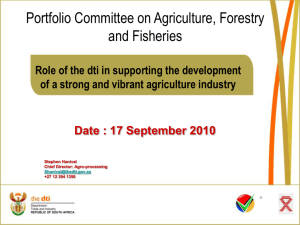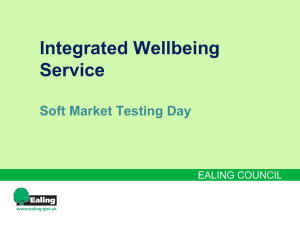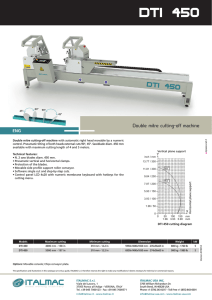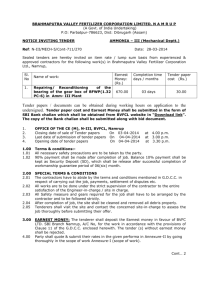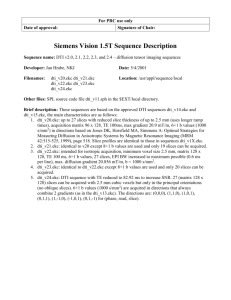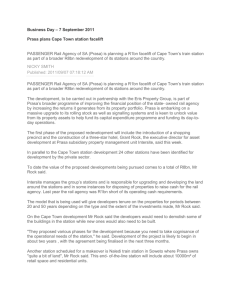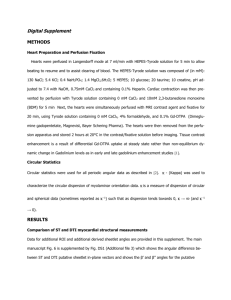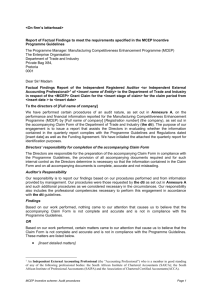THE NATIONAL ASSEMBLY
advertisement
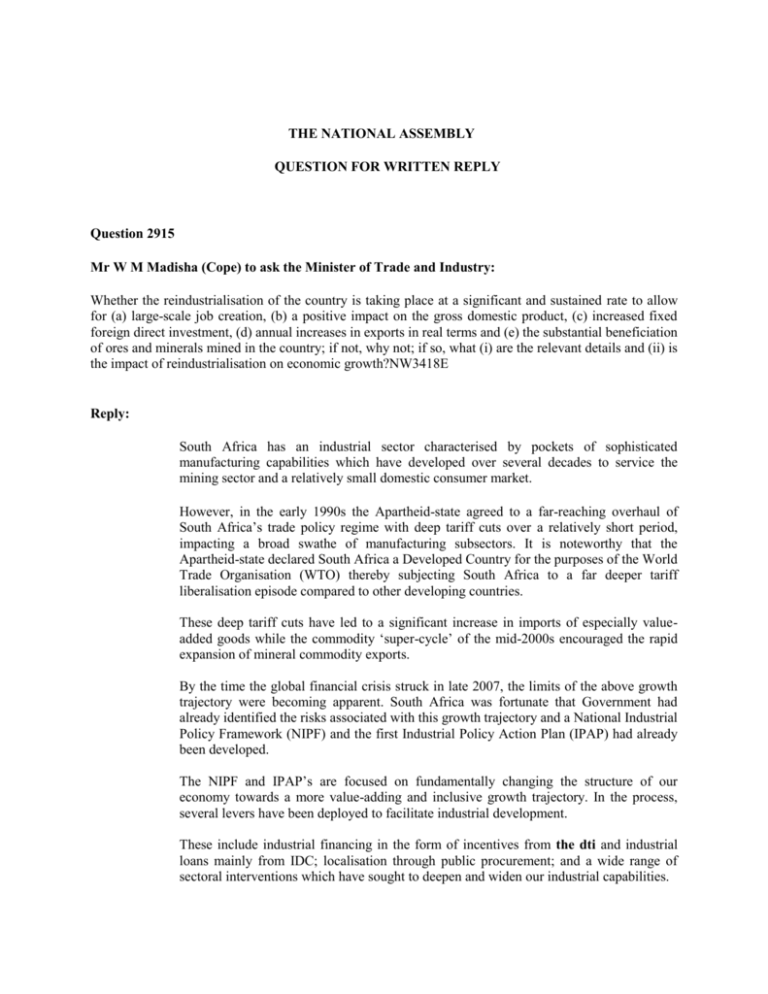
THE NATIONAL ASSEMBLY QUESTION FOR WRITTEN REPLY Question 2915 Mr W M Madisha (Cope) to ask the Minister of Trade and Industry: Whether the reindustrialisation of the country is taking place at a significant and sustained rate to allow for (a) large-scale job creation, (b) a positive impact on the gross domestic product, (c) increased fixed foreign direct investment, (d) annual increases in exports in real terms and (e) the substantial beneficiation of ores and minerals mined in the country; if not, why not; if so, what (i) are the relevant details and (ii) is the impact of reindustrialisation on economic growth?NW3418E Reply: South Africa has an industrial sector characterised by pockets of sophisticated manufacturing capabilities which have developed over several decades to service the mining sector and a relatively small domestic consumer market. However, in the early 1990s the Apartheid-state agreed to a far-reaching overhaul of South Africa’s trade policy regime with deep tariff cuts over a relatively short period, impacting a broad swathe of manufacturing subsectors. It is noteworthy that the Apartheid-state declared South Africa a Developed Country for the purposes of the World Trade Organisation (WTO) thereby subjecting South Africa to a far deeper tariff liberalisation episode compared to other developing countries. These deep tariff cuts have led to a significant increase in imports of especially valueadded goods while the commodity ‘super-cycle’ of the mid-2000s encouraged the rapid expansion of mineral commodity exports. By the time the global financial crisis struck in late 2007, the limits of the above growth trajectory were becoming apparent. South Africa was fortunate that Government had already identified the risks associated with this growth trajectory and a National Industrial Policy Framework (NIPF) and the first Industrial Policy Action Plan (IPAP) had already been developed. The NIPF and IPAP’s are focused on fundamentally changing the structure of our economy towards a more value-adding and inclusive growth trajectory. In the process, several levers have been deployed to facilitate industrial development. These include industrial financing in the form of incentives from the dti and industrial loans mainly from IDC; localisation through public procurement; and a wide range of sectoral interventions which have sought to deepen and widen our industrial capabilities. It is important to note at the outset that industrialisation cannot be achieved through the implementation of isolated interventions in a single year. Rather, industrialisation requires the implementation of a range of interventions over the medium-term to change the structure of the economy. The global economic context can constrain or encourage these developments. Progress made on the re-industrialisation programme: Examples of progress will be drawn from Automotives; Clothing, Textiles, Leather and Footwear; Green industries; Agro-processing; industrial financing, and procurement. Automotive industries: All the major automotive OEM’s are operating in SA - Mercedes Benz, BMW, Volkswagen, Toyota, General Motors, and Ford and the new players include Iveco (Italy), Tata (India), BAW (China), FAW (China) and Hyundai (South Korea). With the policy certainty which Government has provided, the private-sector has invested over R25,7bn over the last 5 years, sustaining about 300,000 jobs. Auto exports exceeded R100bn for the first time in SA’s history in 2014. Clothing, Textiles, Leather & Footwear: In order to stabilise the sector, the Clothing and Textiles Competitiveness Programme (CTCP) was introduced in 2010. The Manufacturing Value-addition increase attributable to the CTCP between the base of 2009 and 2014 is R3.9 billion. About 68,000 jobs have been retained in the sector and 6,900 jobs created. Metal Products, Engineering & Capital Equipment: Preferential procurement and sector designations have been critical to the development of this value chain. For example, the designation of valves has led to foreign investment by Denmark AVK which has acquired South Africa’s Premier Valves Group (PVG) for R100 million. US technology multinational General Electric (GE) announced a R700 million commitment designed to support innovation, enterprise- and skills-development in South Africa. Grindrod unveiled its cost-effective shunting and short haul locomotive in October 2014.The locomotive boasts 80% local content, and is already being exported to a number of African countries. Green Economy: The dti has strengthened the local content requirements for renewable energy. It progressed from a threshold of 25% in bid window 1 to a threshold of 40% in bid window 4. These local content requirements have resulted in a number of new investments in local manufacturing: SMA Solar Technology South Africa, officially launching its multi-million Rand manufacturing facility in Cape Town and Jinko Solar opening its R80 million plant. Agro-processing: Since 2009 we have supported Agro-processing industries to the value of R1.2 billion through various schemes such as the Manufacturing Competitiveness Enhancement Programme (MCEP) and the Enterprise Investment Programme (EIP). Coega Development Corporation and the dti have partnered to create an R86 million Agroprocessing facility within the Coega IDZ. the dti and JSE-listed Astral Foods partnered in a R200 million feed mill in Standerton to boost South Africa’s agriculture sector. Industrial Finance: The Manufacturing Competitiveness Enhancement Programme in Financial Year (FY) 2014/15 approved 236 enterprises for funding with a total grant value of R1,1bn. This has leveraged private-sector investment of R3,7 billion in support of 28,093 jobs. Under the 12i Tax Allowance, 17 enterprises were approved for funding with a total tax allowance of R2,7bn in FY 2014/15. This has leveraged private-sector investment of R6,7bn in support of the creation of approximately 4,500 jobs. The Enterprise Investment Programme – for FY 2014/15, 39 enterprises were approved for funding with a total grant value of R147m. This has leveraged private-sector investment of R1,3bn in support of the creation of approximately 1,500 jobs. The National Empowerment Fund (NEF) approved 549 transactions worth more than R5.4 billion for black-empowered businesses across the country, supporting over 47,000 jobs. The Industrial Development Corporation (IDC) approved projects to the value of R7,7 billion with 6,899 jobs created and 4,668 jobs saved between April 2014 and December 2014 Procurement localisation (designations): Given the R3,6 trillion infrastructure build programme, failure to designate would lead to substantial import leakages and a missed industrialisation opportunity. In total 16 products or sectors have now been ‘designated’ for localisation in government procurement. PRASA has awarded a tender to Alstom for the manufacturing of 7,224 coaches at a projected cost of R123bn to be built between 2015 and 2025, the initial phase is estimated to create over 8,000 direct jobs. As part of this deal, PRASA and Gibela Rail Transportation signed a contract to supply the state agency with 600 commuter trains (3,600 coaches) valued at R51 Billion. Transnet has awarded a total of R50bn in contracts to CSR Zhuzhou Electric Locomotive, CNR Rolling Stock SA, Bombardier Transportation SA and General Electric SA to build 1,064 electric and diesel locomotives in SA. All but 70 locomotives, will be built in Transnet Engineering’s plants in Pretoria & Durban. Pharmaceuticals: Four pharmaceutical companies were jointly awarded a R10 billion tender to supply the Department of Health with antiretroviral (ARV) medication from 1 April 2015 to 31 March 2018. The tender had a conditional provision for designation of up to 70% of the tender volume for domestic manufacturers. DoH announced the tender valued at R14 billion of which 61.6% was won by companies that have manufacturing plants in SA.
